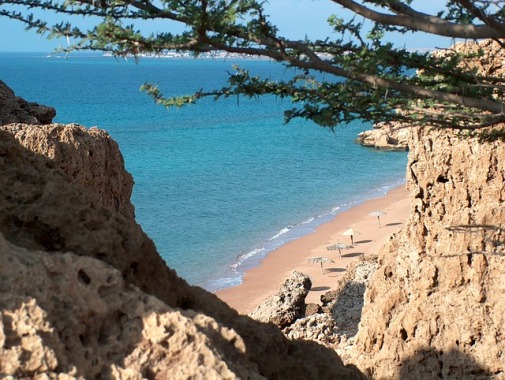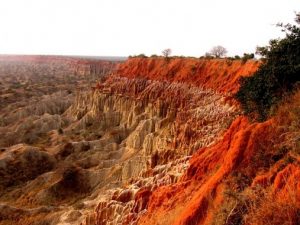Djibouti, or officially – the Djibouti Republic, is located in Africa.
It is bordered by Somaliland, Ethiopia, Eritrea, Gulf of Eden and the Red Sea.
It is known for the lake Assal which has saltier water that the Dead Sea.
It is an exciting place to visit since there are so many things to see and do.
You can go to the desert or dive into the Red Sea and be amazed by all the species you will find there.
The food is tasty and very diverse – you can opt for Franch croissants or Indian food, it is up to you.
Warnings & Dangers in Djibouti

OVERALL RISK : MEDIUM
The crime rate is relatively low in Djibouti and the chances are you won't have any inconvenience here. However, some common sense and caution are necessary. Do not go alone to areas such as Khor Ambado and Dorale, especially after dark.

TRANSPORT & TAXIS RISK : LOW
The public transport is fairly safe. There are daily ferries, water taxies, buses, and regular buses to choose from. Tourists can also rent a car to get around Djibouti and explore.

PICKPOCKETS RISK : MEDIUM
Pickpocketing occurs and tourists should be alert at all times. Always keep an eye on your things and don't let your guard down. Never leave your personal belongings unattended and leave the original passport in the hotel. Keep your wallet in the front pocket.

NATURAL DISASTERS RISK : MEDIUM
Djibouti is susceptible to droughts, floods, and severe earthquakes. Droughts last long and when they occur they affect the population severely. The government has taken a lot of steps to protect its citizens. If you find yourself in Djibouti during an earthquake, make sure you follow the security protocol.

MUGGING RISK : LOW
Even though violent crimes are not frequent, some caution is still advised. Make sure you don't go to the risky areas and always keep in mind not to attract too much attention with expensive items. Stay alert during your entire stay.

TERRORISM RISK : HIGH
Terrorist attacks are likely to occur in Djibouti, so make sure you remain vigilant at all times. The border with Eritrea is especially risky, so tourists are strongly discouraged from visiting. In case you notice anything suspicious, follow the recommended protocol.

SCAMS RISK : MEDIUM
The common scam that affects the tourists is overcharging for a taxi ride. Tourists are easy targets because the country is poor and tourists usually carry money, so make sure you negotiate the price before you actually sit in one.

WOMEN TRAVELERS RISK : MEDIUM
Djibouti is relatively safe for female tourists, but still, caution is advised. Make sure you don't wander alone at night and apply basic precautions during your entire stay. Keep your belongings close to you and stay alert. Be careful when withdrawing money from the ATM.
How Safe Is Djibouti for Tourists?
Djibouti is a beautiful country and most tourists have a great time.
However, it is necessary to be cautious since petty crime does exist here so it is important to stay alert.
Do not go too close to the border with Eritrea because it may be too risky.
Besides that, tourists should be careful when carrying cameras.
In most places, taking pictures is forbidden, so make sure you check first so you don’t get in trouble.
Depending on the place where you take a picture, you may be arrested, so stay alert.
Also, it is important that you treat the locals with respect and acknowledge their customs because the majority are Muslims.
Get familiar with some basic rules and be particularly careful during Ramadan, Muslim holy month.
Women should avoid wearing provocative clothes because that may offend the locals.
Earthquakes are frequent and it is important to familiarize yourself with the safety protocol in case you find yourself there when one occurs.
Other than that, there shouldn’t be any issues.
Make sure you try everything that Djibouti has to offer – dive, swim, work on your tan and go snorkeling if you wish to explore the sea, just be careful along the way.
Do I Need a Visa to Visit Djibouti?
All tourists must have a visa for visiting Djibouti.
It can be obtained online or upon arrival.
The passport must be valid at least six months after the planned stay.
Which Currency Is Used in Djibouti?
The official currency is Djiboutian franc.
The symbol is Fdj.
One U.S. dollar equals 177,72 Djiboutian Franc.
Make sure you bargain when buying since it is a local custom here.
How's the Weather like in Djibouti?
The climate in Djibouti is tropical, so the temperature is high all year round with small variations.
During the winter period, it goes around 29°C and in May it goes up to 35°C.
What Do I Need to Know about Airports in Djibouti?
Djibouti has five airports in total and the biggest one is Djibouti–Ambouli International Airport.
It is located in Ambouli, 6km away from the center.
It handles about 250,000 passengers a year.
Should I Get Travel Insurance for My Travels?
All tourists should have travel insurance no matter how long the vacation may last.
Make sure you get at least the basic coverage that includes theft, loss of luggage and medical expenses.
What Are Some Things to Do in Djibouti?
When in Djibouti, make sure you visit Moucha Island where you can enjoy the beach and nice clear water.
Lake Abbe is something you shouldn’t miss.
When you finish sightseeing, you must try the local dishes.
Is the Water in Djibouti Safe to Drink?
The safety of the tap water depends on the region, so tourists must be very careful.
To be on the safe side, make sure you consume bottled water or boil it.
Is Uber Safe in Djibouti?
There is no Uber service in Djibouti, but there are local taxies.
It is recommended to negotiate the price before starting the ride so you don’t get an enormous price at the end.




